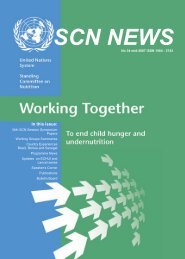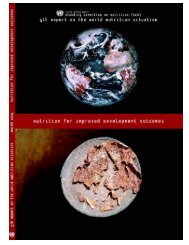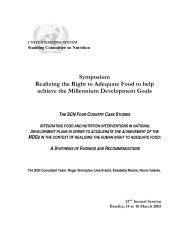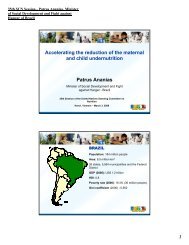Universal Salt Iodization (USI) - FTP Directory Listing
Universal Salt Iodization (USI) - FTP Directory Listing
Universal Salt Iodization (USI) - FTP Directory Listing
- No tags were found...
Create successful ePaper yourself
Turn your PDF publications into a flip-book with our unique Google optimized e-Paper software.
www.unsystem.org/scn PROGRAMME NEWS 63Acting Locally in Food Security, Nutrition and Livelihoods: FSNL Discussion GroupFAOToday, networks and initiatives supporting interagency collaboration on strategies and policy-making are mushroomingthroughout the development world and humanitarian community, in nutrition as well as in other subjects. An excellenttendency, one ought to recognize.However, field operators - any operator, national or international, from UN agencies, Governmental institutions, NGO/CSOs (including confessional NGOs) working on nutrition, food security and livelihoods at local level - have often defacto been marginalised: they are spread all over the world, often in remote locations, rarely attend meetings but actuallyhave hands-on experience. On the one hand they feel isolated and out of the information loop, and on the other theyhave a lot to contribute.What is needed is a network to connect these people into a virtual community. While we are well aware that not all fieldactors have easy access to computers and internet, Information Technology is increasingly available worldwide, andrelay institutions can help expand the network further.The discussion group “Acting locally in food security, nutrition and livelihoods” (FSNL D-group) was thus set up and presentedto the Household Food Security Working Group during the SCN 2007 Annual Session in Rome, but has onlyrecently been launched.This D-Group was developed in parallel to the Global Food Security and Nutrition Forum (FSN Forum, link), launched byFAO’s Agricultural Development Economics Division (ESA) on October 16 th , 2007. These two initiatives arecomplementary: while the latter is a multi-features platform involving, between others, academics, researchers andpolicy-makers in discussions focusing on policies and strategies, the FSNL D-Group is a lighter tool, allowing fieldoperators to interact on issues of common interest.The FSNL D-Group will also contribute to the documentation, sharing and peer reviewing of concrete field experiences,and will be linked to the 3W (Who does What, Where) contact management directory being developed in parallel, thuscontributing to creating a pool of best practices and contacts for field activities.For joining the “Acting Locally in Food Security, Nutrition and Livelihoods” D-Group (www.dgroups.org/groups/fao/FSN),subscribe online or contact Chiara Deligia, FSNL Moderator, at chiara.deligia@fao.orgJoining forces for ensuring Adequate Nutrition and Health ECOWASAs a follow-up to the September 2006 10 th ECOWAS Nutrition Forum in Cape Verde – which was strongly supported bythe SCN, see SCN News #33 (online), the West African Health Organisation (WAHO) and Bioversity International, intechnical cooperation with FAO, organized a regional workshop on Partnerships for Mobilizing the Diversity in TraditionalFood Systems to Ensure Adequate Nutrition and Health.The 2-day meeting which was supported by the Canadian International Development Agency (CIDA), the InternationalDevelopment Research Centre (IDRC), the Global Facilitation Unit for Underutilized Species (GFU) and the West AfricanEconomic and Monetary Union (WAEMU) was perceived as a major breakthrough since it was the first time policy anddecision makers from the health and agriculture sectors in these countries met and worked together on a theme of commoninterest. Alleviating malnutrition can only be achieved if both sectors take the lead jointly at country level.Food consumption patterns in Africa have been affected by economic, demographic and environmental change. Dietshave become increasingly monotonous as traditional food systems are eroded and foods within the food systems areforgotten. The retrieval of indigenous knowledge and sustainable management of local biodiversity are key to both improveddiets and sustainable livelihoods.A total of 43 representatives from national, regional and international institutions and organizations, including representativesof the private sector, participated in the workshop. Participants were provided contextual information for effectivepolicy formulation and programme implementation, including a presentation of the SCN on behalf of the Secretariat. Furtherinformation on the workshop and in particular the agenda and list of participants - can be found online.A key recommendation of the workshop was the creation of a data base of traditional and indigenous foods, and a mappingsystem for identifying available food sources at different times of the year. There was a general recognition of thefact that there already exists a wealth of knowledge and experience on which to build future activities but these need tobe documented and shared. A mechanism should therefore be established to search and document such informationand make them readily available. Improving safety, quality and competitiveness of traditional foods through improvedfood processing were explored. Participants identified the need for strong advocacy and effective multidisciplinary andmultisectorial alliances and agreed on plans of action to be carried out upon return to their respective countries.back to contents SCN NEWS # 35







